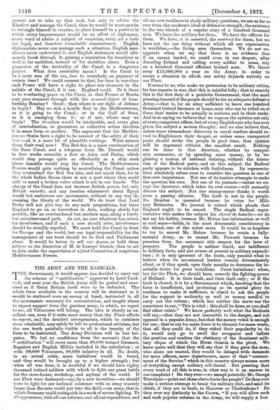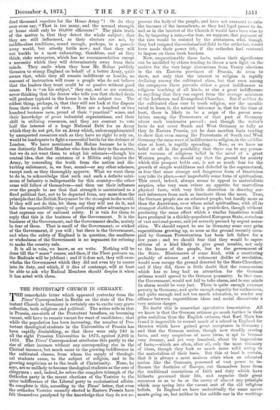gades. We feel no confidence from the accounts that the
the position and confirm the obstinacy of the dominant
mobilisation " will cover more than 40,000 trained linesmen, tarp clique of which the Horse Guards is the pivot. We Regulars and English Militia included in the calculation ; or know quite well that they 'will say that if they gave the men, with 50,000 Volunteers, 90,0150 infantry in all. No doubt, who alone are wanted, they would- be deluged with demands in an actual crisis, more battalions would be found, for more officers, more departments, more of that" content- -and they would be brought up to a higher strength ; but ment of the Service" which in this country always means more rwhen all •was done, it is doubtful if we should have eighty of everything except military self-denial. But granting that thousand trained soldiers with which to fight one great battle every word of all this is true, in what way is it an answer to for the store-house, workshop, and asylum of the world. If our complaint ? Do they ever—we except pointedly Mr. George our Fleet were destroyed—say, by a new invention—we should •Trevelyan--point out these obstacles to the people? Do they ever have to fight for our national existence with an army scarcely make a serious attempt to break the •military club, and send its larger than Bavaria could put into the field,—an army, that is, chiefs, if they are in fault, to Hanover or Cheltenham ? Do which Germany could extinguish in a week of severe fighting. To they ever say distinctly to the Crown, " If you will allow such all appearance, with all our reforms, and all our expenditure, and , and such popular reforms in the Army, we will supply a hun
believe when its accustomed leaders remain deternainately silent, or if they speak, open their mouths to denounce the in- THE ARMY AND THE RADICALS. satiable desire for great battalions. Great battalions when, Bred thousand regulars for the Home Army "? Or do they ever even say, "That is too many, and the normal strength at home shall only be 60,000 efficients?" The plain truth of the matter is, that they detest the whole subject; that they are still influenced, as their electors are not, by middle-class traditions, sound enough, perhaps, in a passed- away world, but utterly futile now ; and that they will not buckle to a most exhausting, thankless, and as they think, risky enterprise, which has no recommendation except a necessity which they will determinately away from their minds. They smile when they hear Mr. Hohns publicly threaten to stump England on behalf of a better Army, quite aware that, while they all remain indifferent or hostile, no amount of instruction will rouse a people who do not believe that the leaders they trust could be so passive without good cause. He is "on his subject," they say, and so are content, never thinking that the doctor who tells you that choked drain will produce typhoid in the house is on his subject too. The oddest thing, perhaps, is, that they will not look at the dispute from their own point of view. Here are a hundred or two hundred business men, proud of their "practical" sense, and their knowledge of great industrial organisations, and their skill in utilising resources, and they are content to vote half the interest of a huge National Debt for an Army which they do not get, for an Army which, unless supplemented by unexpected resources such as they have no right to rely on, would be inadequate to fight a successful battle for the defence of London. We have mentioned Mr. Holms because he is the one distinctly Radical Member who does his duty in the matter, but we do not want them to adopt his schemes—though his central idea, that the existence of a Militia only injures the Army, by concealing the truth from the nation and dis- turbing enlistment, is, we fear, sound—or any other schemes, except such as they thoroughly approve. What we want them to do is, to acknowledge that such and such a definite mini- mum of Infantry is indispensable for this country—the other arms will follow of themselves—and then use their influence over the people to see that that strength is maintained as a fixed political fact, not to be departed from, any more than the prinoiple that the British Navy must be the strongest in the world. If they will not do this, let them say they will not do it, and take the responsibiltty openly of preferring other advantages to that supreme one of national safety. It is vain for them to reply that this is the business of the Government. It is the business otthe Government, and the Government skulks, mainly in fear of them. That is small of the Government, or wicked of the Government, if you will ; but there is the Government, and when the safety of England is in question, the smallness or wickedness of the Government is no argument for refusing to make the country safe.
It is all in vain, we know, as we write. Nothing will be done till the " scare" comes, and then, if the Fleet protects us, the Radicals will be jubilant ; and if it does not, they will over- whelm the Government which they did not even try to coerce into its duty, and which, if it dies of contempt, will at least be able to ask why Radical Members should despise it when it has acted with them.







































 Previous page
Previous page